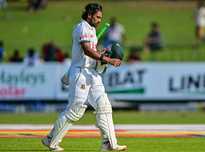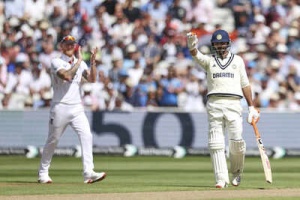TOI in New York: Carlos Alcaraz wore different smiles at the Arthur Ashe Stadium. Sometimes he grinned, dazzled by his own brilliance. Other times, he beamed, swept up in the energy of a crowd with whom he shares an electric connection everywhere he goes, but especially in New York City, home to 2.42 million Hispanics. And then there were the quieter moments, when he stared into the stands, shook his racket, and let a slow smile rise to his lips.
The atmosphere crackled. Most of the crowd looked like they had shown up for the Alcaraz Sunday Show, and he did not disappoint. Spike Lee jumped to his feet, applauding the Spaniard. Steph Curry simply raised his arms, a nod to the masterclass unfolding on the court. Jimmy Connors pushed back in his seat, and Stefan Edberg leaned in.
Go Beyond The Boundary with our YouTube channel. SUBSCRIBE NOW!
Then, when it was done—6–2, 3–6, 6–1, 6–4 in two hours and 42 minutes—Alcaraz dropped to his haunches and laughed. It was a hearty expression. The Spaniard’s methodical annihilation of defending champion Jannik Sinner in the US Open final sealed his return to the No. 1 ranking for the first time since September 2023.
“It was one of the first goals I had during the season, to try to recover the No.1 as soon as possible or end the year as the No.
1,” Alcaraz said. “For me, to achieve that once again is a dream. Doing that on the same day as winning another Grand Slam feels even better.”
What Alcaraz produced on Sunday at Flushing Meadows to notch his 13th straight win was something Sinner was not prepared for. He ripped forehands cross-court, shifted angles by the slightest margins to catch his opponent just short, and served at near-manic speeds. Sinner managed just 10 points off Alcaraz’s first serve in the match.
Alcaraz’s intense focus during the US hardcourt swing was fueled by his gripping rivalry with Sinner. The 22-year-old did not just react to his loss in the Wimbledon final to Sinner; he responded to it. On that English summer evening two months ago, Alcaraz lost to a player who was not just more solid on the day. Sinner played Alcaraz’s own shots and played them better.
After a week’s break in July, the Spaniard returned to the practice courts. He worked on his consistency, learned to discipline his shot selection, drawing from an outrageous range, and added bite to his serve before heading to Cincinnati.
“Right after the Wimbledon final, I thought I needed to improve some specific things if I wanted to beat him,” Alcaraz said. “I spent two weeks before Cincinnati just practicing some things.”
“I studied the Wimbledon final with my coaches. We spoke about what we could have done better in that match when I face him another time. We noted everything and we worked on it. In the beginning, we thought it did not matter if he won or I won. I just wanted to do the right things. If I did the right things and he played an unbelievable match, it was okay, but at least I did the right things.”
Sinner came into the final with a hard-court Grand Slam record of 27-0. It was not lost on Alcaraz and his team. On his return to competition in Cincinnati, Alcaraz, who has a tendency to drift in and out of matches like a weak radio signal, charged to the title, dropping just two sets along the way. In New York, he lost only one set, to Sinner in the final.
Jannik Sinner’s US Open campaign had been a struggle, not because of inexperience, but because he dropped a couple of sets en route to the final. In the semifinals against Felix Auger-Aliassime, he appeared out of sorts and needed medical attention for what he later described as a twitch.
On Sunday, playing his fifth successive major final, Sinner was outsmarted by Alcaraz in four sets. The 24-year-old Italian, who had not been at his best physically throughout the tournament, vowed to be less predictable with his play going forward even if it came at the cost of some matches.
“I was very predictable today on court. He did many things, he changed his game. That's also his style, how he plays,” Sinner said. “Now it's going to be on me if I want to make changes or not. We are definitely going to work on that.”
Sinner also said that his run to the final showed how much he needed to push out of his comfort zone against a player like Alcaraz. “When you always do the same things like I did during this tournament, I didn't make one serve-volley, didn't use a lot of drop shots, and then you arrive at a point where you play against Carlos where you have to go out of the comfort zone,” he said.
“I'm going to aim, maybe even if I lose some matches from now on, to try to make some changes, trying to be a bit more unpredictable,” Sinner added.
“For sure, my serve today was not on point. I felt I was struggling a lot today, but it was already struggling during the tournament,” he said. “One secret is also patience. It's not like in Beijing I'm going to be a lefty.”
Sunday’s loss ended Sinner’s 65-week reign at the top of the ATP rankings. “I'm going to change a couple of things on the serve, just small things, but they can make big differences,” he said. “Then we see how it goes. I'm looking forward to playing these matches again. It’ll be new since I'm not No. 1 anymore. It changes a little bit when you chase.”
The last time Alcaraz found himself in a similar position—falling short in a match he desperately wanted to win—was 12 months ago after losing the gold medal clash to Novak Djokovic at the Paris Olympics. The 22-year-old also lost in the second round of the US Open to Botic van Zandschulp and managed to win only one tournament two months later in Beijing. His next title came in Rotterdam in February, but it was not until Monte Carlo in April that he truly found his rhythm again.
In New York, Alcaraz took a page out of Sinner’s book and returned the compliment the Italian had paid him at Wimbledon. But the Spaniard did not mirror Sinner’s consistency and efficiency. He simply sharpened his own game, increasing his precision.
The final, already a historic affair since Alcaraz and Sinner became the first players in the Open Era to contest three Grand Slam title matches in the same season, got off to a delayed start due to the arrival of President Donald Trump.
Alcaraz broke Sinner in the opening game to set the tone for the match. The 24-year-old raised hopes in the second set, but the dissonance in his play throughout New York, not just in the final, began to surface. When he broke in the second game of the third set, he looked very much in charge again, bullying the Italian with his power and placement.
Catch Lovlina Borgohain's inspiring story on Game On, Episode 5. Watch Here
 Greg Chappell Hails Rishabh Pant's Explosive Batting, Sees Adam Gilchrist Echoes
Greg Chappell Hails Rishabh Pant's Explosive Batting, Sees Adam Gilchrist Echoes
 Bangladesh Test Skipper Najmul Hossain Resigns Following Sri Lanka Defeat
Bangladesh Test Skipper Najmul Hossain Resigns Following Sri Lanka Defeat
 Rishabh Pant's Revolutionary Batting Style is Reinventing Cricket: Greg Chappell's Bold Claim
Rishabh Pant's Revolutionary Batting Style is Reinventing Cricket: Greg Chappell's Bold Claim
 Asia Cup 2025: ACC Targets September Launch Amid Easing India-Pakistan Tensions
Asia Cup 2025: ACC Targets September Launch Amid Easing India-Pakistan Tensions
 Gavaskar Calls for Kuldeep Yadav's Inclusion in Second Test, Questions Thakur's Performance
Gavaskar Calls for Kuldeep Yadav's Inclusion in Second Test, Questions Thakur's Performance
 Pogba Resurrects Career, Joins AS Monaco After Doping Ban
Pogba Resurrects Career, Joins AS Monaco After Doping Ban
 ICC Test Rankings: Pant Hits Career-High, Bumrah Reigns Supreme, Root Still King
ICC Test Rankings: Pant Hits Career-High, Bumrah Reigns Supreme, Root Still King
 Prasidh Krishna Vows to Sharpen Length, Cut Run Rate After Headingley Expense
Prasidh Krishna Vows to Sharpen Length, Cut Run Rate After Headingley Expense
 Ravindra Jadeja's Solo Practice Raises Questions Amidst India's Strong Test Performance
Ravindra Jadeja's Solo Practice Raises Questions Amidst India's Strong Test Performance
 India's Squad Update: Harshit Rana Released Before Second Test Against England
India's Squad Update: Harshit Rana Released Before Second Test Against England